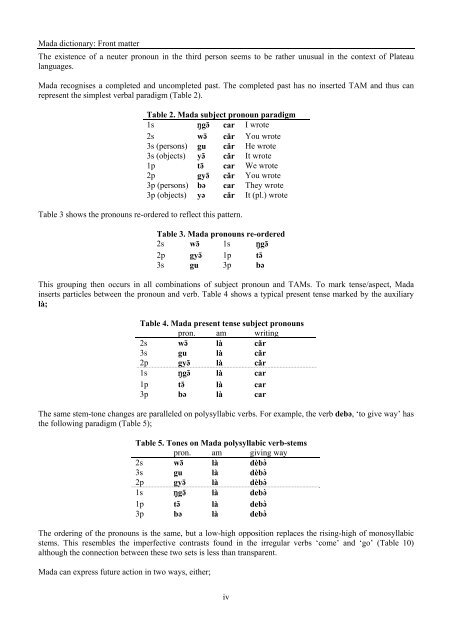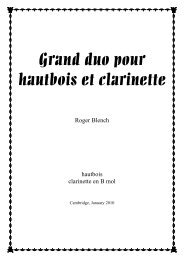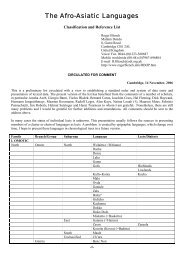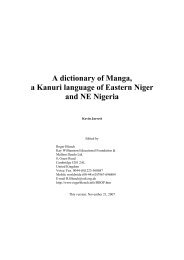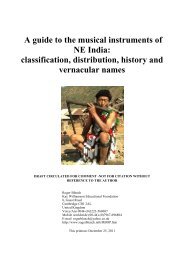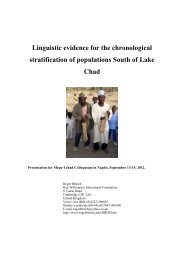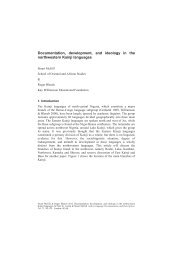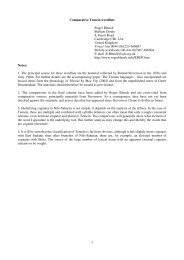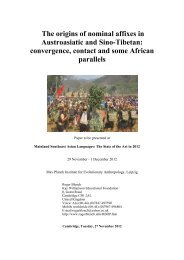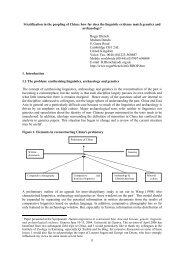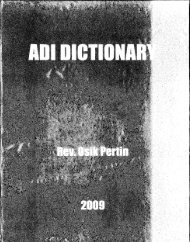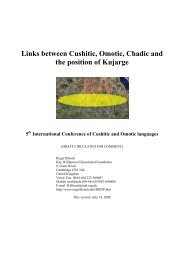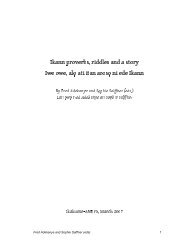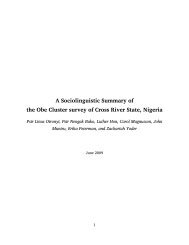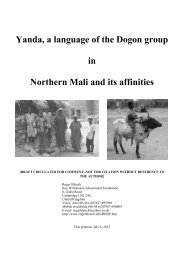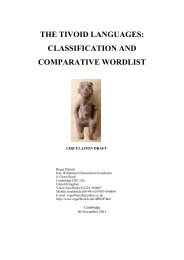A DICTIONARY OF MADA, A PLATEAU LANGUAGE ... - Roger Blench
A DICTIONARY OF MADA, A PLATEAU LANGUAGE ... - Roger Blench
A DICTIONARY OF MADA, A PLATEAU LANGUAGE ... - Roger Blench
You also want an ePaper? Increase the reach of your titles
YUMPU automatically turns print PDFs into web optimized ePapers that Google loves.
Mada dictionary: Front matter<br />
The existence of a neuter pronoun in the third person seems to be rather unusual in the context of Plateau<br />
languages.<br />
Mada recognises a completed and uncompleted past. The completed past has no inserted TAM and thus can<br />
represent the simplest verbal paradigm (Table 2).<br />
Table 2. Mada subject pronoun paradigm<br />
1s Ngə̄ car I wrote<br />
2s wə̄ cǎr You wrote<br />
3s (persons) gu cǎr He wrote<br />
3s (objects) yə̄ cǎr It wrote<br />
1p tə̄ car We wrote<br />
2p gyə̄ cǎr You wrote<br />
3p (persons) bə car They wrote<br />
3p (objects) yə cǎr It (pl.) wrote<br />
Table 3 shows the pronouns re-ordered to reflect this pattern.<br />
Table 3. Mada pronouns re-ordered<br />
2s wə̄ 1s Ngə̄<br />
2p gyə̄ 1p tə̄<br />
3s gu 3p bə<br />
This grouping then occurs in all combinations of subject pronoun and TAMs. To mark tense/aspect, Mada<br />
inserts particles between the pronoun and verb. Table 4 shows a typical present tense marked by the auxiliary<br />
là;<br />
Table 4. Mada present tense subject pronouns<br />
pron. am writing<br />
2s wə̄ là cǎr<br />
3s gu là cǎr<br />
2p gyə̄ là cǎr<br />
1s Ngə̄ là car<br />
1p tə̄ là car<br />
3p bə là car<br />
The same stem-tone changes are paralleled on polysyllabic verbs. For example, the verb debə, ‘to give way’ has<br />
the following paradigm (Table 5);<br />
Table 5. Tones on Mada polysyllabic verb-stems<br />
pron. am giving way<br />
2s wə̄ là dèbə̀<br />
3s gu là dèbə̀<br />
2p gyə̄ là dèbə̀<br />
1s Ngə̄ là debə̀<br />
1p tə̄ là debə̀<br />
3p bə là debə̀<br />
The ordering of the pronouns is the same, but a low-high opposition replaces the rising-high of monosyllabic<br />
stems. This resembles the imperfective contrasts found in the irregular verbs ‘come’ and ‘go’ (Table 10)<br />
although the connection between these two sets is less than transparent.<br />
Mada can express future action in two ways, either;<br />
iv


